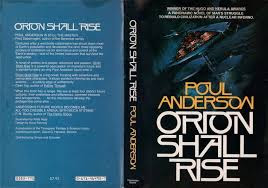Orion Shall Rise, CHAPTER SEVEN.
I remember learning the difference between a fiction and a lie. Is there a third category: the yarn? A tall tale presented as a reminiscence but primarily intended to entertain? I was concerned when a teacher denounced a comic strip that I enjoyed reading as "Lies!" He was confounding my recently learnt distinction between lies (bad) and fictions (good). A child once asked me to confirm that a Wild West TV series was set so long ago that its characters would now be dead. She had it partly right. She understood that the drama was set a long time ago but I had to explain, in addition, that those were fictional characters. They had never existed in any case. In my second year at secondary school, I was amazed when a new pupil said that he did not believe that there was such a person as Superman! I had never thought that there was.
This is all relevant. In this chapter of Orion Shall Rise, the fiction contains a lie but whose? Iern alleges that Jovain tried to kill him but the latter denies it. Which of them is lying? Are we told later? I can't remember. If we are not, then who knows...?
In "The Hildebrand Rarity" by Ian Fleming, a man has been murdered either by his wife or by another man but James Bond cannot deduce which. So which of them did it? It matters to Bond because he cannot risk having a relationship with a woman capable of killing her husband but, having published an ambiguous text, even Fleming cannot tell us which of them did it. He could have written a sequel but he didn't...

5 comments:
Kaor, Paul!
I think it was while first reading Niven and Pournelle's THE MOTE IN GOD'S EYE that I first came across the definition of lies and fictions, and of how the latter was not a bad thing. Before then I had merely kinda known in an undefined way the difference between the two.
Ad astra! Sean
The distinction between fiction and lies is essentially one of intent to decieve.
Kaor, Mr. Stirling!
And that was the point Niven/Pournelle had their Moties making, with the concept of "fiction" being very strange to them!
Ad astra! Sean
The conditional-hypothetical is an essential part of human thought, which is inherently metaphorical and narrative in nature.
That's what Nietzsche meant when he pointed out that there are no facts, only interpretations of facts.
"Facts" as commonly understood -- data -- can only be incorporated into human consciousness by interpretation. They have no -meaning- by themselves.
Kaor, Mr. Stirling!
I agree. Nothing can make SENSE without it first being interpreted.
Ad astra! Sean
Post a Comment